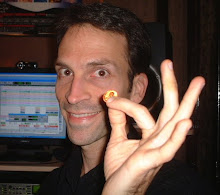I hope this summer finds you all busy with gigs, saving like the proverbial ant, because we all know that when gigs dry up next January, the grasshoppers among us will be going hungry!
Thanks for all of the comments since my last post. Some have expressed concern over recent underperformance of traditional investments like stocks and CDs. While I'm not in the business of recommending specific investments or prognosticating about market ups and downs, I want to emphasize the importance of taking a long-term investment perspective. The fact is, the overall U.S. stock market has averaged more than a 10% return over the past 20, 50, even 100 year periods. So a year or two of low or even negative returns shouldn't be cause for most investors to panic.
Some folks, however, probably would like to see a more immediate benefit. That's why today, I'd like to offer further savings encouragement by explaining how even a modest nest egg can quickly make your life easier. How much is a "modest" amount? Of course, that depends on your individual situation, but my rule of thumb is that a single person with little or no debt should shoot for having at least a $10,000 emergency fund to begin with. I can clearly remember when I first passed that milestone years ago. I certainly wasn't rich (and I'm still not), but I immediately felt significant peace of mind from having that "cushion" to fall back on. This feeling has never left me, and has actually given me more confidence to take chances in my musical career. Honestly, I'm not sure that I would still be persisting as a musician today if I wasn't confident that I could get through a slow period of gigs.
You can surely save up 10 grand. It might take a couple of years, you might even have to take a day job for a while, but you can get there. Now, once you have that emergency money, you must resolve not to touch it, except in true emergencies (examples: hospitalization, your car dies suddenly, etc.). Recording your next CD is NOT an emergency. To avoid depleting your emergency fund, it's important to keep the money in a separate account from the checking account used for your day-to-day living expenses. Many people use a savings account. I also recommend looking into money market savings accounts for this purpose, which often pay superior interest. And if you do dip into the emergency account, replenishing it must become top priority.
All of the above is common, standard personal finance advice. But here is the often unmentioned, really cool thing about having a little financial cushion: it actually saves you money! No more bank fees for overdrafts, bounced checks, or falling below the minimum balance. On the occasions when you do have a real emergency, you won't have to resort to credit cards or high interest loans. Your emergency fund can even serve as collateral if necessary. These savings add up significantly over time, and once you start to see the advantage of having a nest egg, you will probably get inspired to step up your savings toward other goals. Next time, I'll discuss more ways that having money can save you money.
Subscribe to:
Post Comments (Atom)






No comments:
Post a Comment